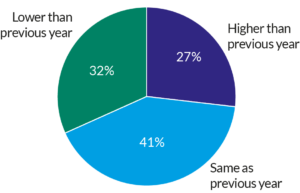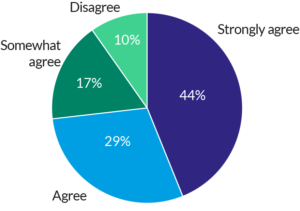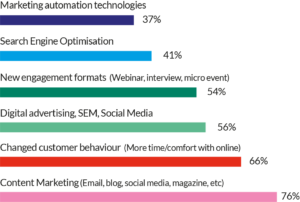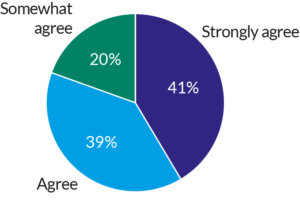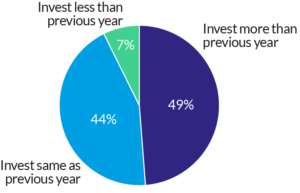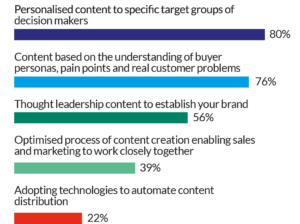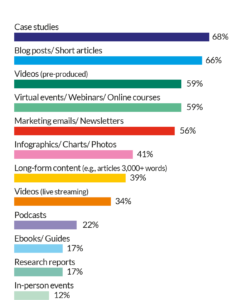A historic year has changed content marketing forever, but how will it affect the future?
2020 transformed digital marketing among tech B2B companies. Event cancellations, travel restrictions and lockdowns made marketers re-evaluate their strategies and quickly adapt delivery.
There is no doubt that 2020 was the year content marketing came into its own. Tech B2B marketers and sales teams were under pressure to continue to deliver leads through new channels.
Working with companies in multiple niche areas within the tech B2B space, we witnessed first-hand the resilience and agility of different verticals adopting new strategies and approaches to marketing. We wanted to understand specifically what worked, and what didn’t work, for tech B2B marketers in such a difficult year and what challenges and opportunities lie ahead in 2021.
And what better way than to ask market leaders who were walking the walk daily? In December 2020, we conducted a survey of B2B tech content marketing leaders around the world, seeking to create a benchmark to help marketers as they plan ahead.
“2020 has been a good year, in the sense that it accelerated the drive from offline to online.”

This survey and relevant research was conducted in partnership with Higher at Work, a research and strategy consulting firm.
Pivot and invest
Companies began to focus on generating business through digital channels
While budgets came under intense scrutiny, 70% of tech B2B companies reported the same or higher marketing budgets in 2020. Nearly 75% of the participants categorically stated increased dependence on digital marketing to generate leads and new business. Budget earmarked for events and other in-person activities was to some extent moved to content marketing.
“2020 was the best year ever for marketing impact/digital activity.”
Marketing vs COVID-19: a story of lead generation
Strong marketing teams were able to help sales minimise the pain of the pandemic
Last year saw marketing come into its own at supporting the sales function.
Approximately 60% of participants reported success in marketing’s ability to generate leads and new business in 2020. 75% reported an increased dependence on digital marketing within their organisations.
“By August, we were able to see that our campaigns were meeting expectations. We were able to prove with data that digital marketing is getting good leads for the sales team.”
“The new mantra is plan in the long term, flexibly react in the short term.”

Businesses that had invested systematically in content marketing in previous years were better able to capitalise on it in 2020. They successfully made several effective and rapid adaptations in the year, which included:
- Being more agile with marketing strategy and implementation
- Launching multiple targeted campaigns to create new customer touchpoints, compensating for in-person contact
- Taking advantage of changes in the purchase process to upsell and cross-sell
- Capturing data to measure leads and conversions to gain buy-in from senior colleagues companywide
- Supporting colleagues across departments and regions to use digital channels, such as webinars, to engage customers
Content in the limelight
Content-driven campaigns were the mainstay of the year
78% of our tech B2B marketers found that the best way to generate leads was through content such as emails, blogs and social media. From gated long-form assets to social posts, every form factor played a role.
- Thought leadership content helped to strengthen brands and build trust
- Gated content was a valuable source of leads in 2020
- Social media posts generated interest, improved visibility and reached the relevant target audience. This led to enquiries, inclusion in RFP processes and conversions
- Targeted content to fewer but more relevant decision-makers was more effective than a scatter-shot approach.
Pandemic challenges were human challenges…
With high levels of noise online, empathetic marketing helped break through the clutter during 2020
Tech B2B businesses realised in 2020 how important it was to communicate with their customers as people. It became critical to empathise with customers’ challenges – not only in servicing their end-users, but also their other challenges such as working from home, addressing health and safety concerns and managing remotely.
“The way of selling also had to change. We had to be more humanistic, empathetic. B2B customers are also people, also going through a tough time.”
Many B2B tech companies shared content to educate customers on how their technologies can help meet pandemic related challenges – technology to aid new revenue models and new products to meet current and future customer needs.
Identifying the right customer personas, journeys and real pain points; clarifying positioning and messaging helped tech B2B companies stand out from the crowd. Content that educates, informs and addresses pain points was very much the driver of effective marketing, particularly in driving organic traffic. Businesses that had a truly customer-centric approach to content and digital marketing were able to stand out from the rest.
“There was pandemic communication clutter. We had to think: how do we stand out?”
Another important aspect to breaking the clutter was focusing on empathetic communication. Marketing technologies that enable personalised content serving based on audience reactions and behaviour began to be seen as important and are expected to gain ground. Marketing leaders expected AI to play a larger role in personalisation in future.

Challenges of growth and scaling made themselves felt
Budget, the right expertise, and strategy limitations are the biggest challenges
This increased focus on content marketing placed pressure on systems that were not quite ready for upscaling. Nearly half of senior marketers in the space found their resources were stretched to the limit in 2020, citing lack of time and skill as a top challenge. Budget limitations remained an issue with more than a third of companies. Another concern was the need to support regional offices around the world with localised content.
Top content marketing challenges faced by B2B tech organisations
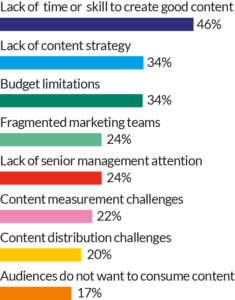
Marketers were looking to engage with content agencies with the right sector experience with a comprehensive offer.
Activities B2B tech organisations outsource to content marketing agencies
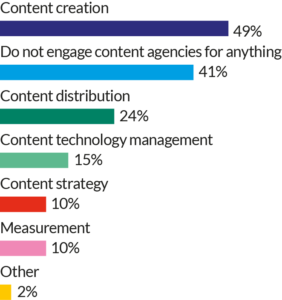
Here’s looking at you, 2021
Content marketing will mature, underpinned by stronger planning, orchestration, and measurement
Respondents to our survey expressed optimism about business growth in 2021, even in the face of uncertainty. Marketers expect to continue relying on digital channels to drive business growth. When in-person events and meetings resume, respondents believed a hybrid model, bringing together the best of offline and online channels, would be the way forward.
“By the time things go back to normal, we will create strategy afresh. We will not go back to the old way of doing things.”
An overwhelming 80% of participants were emphatic that content marketing would be critical to business growth in 2021.
“Content marketing has to become more elevated across the board.”
Content creation and distribution remain important for marketers but measurement features strongly for the first time, especially to leverage the right processes and technologies to help optimise their future content marketing efforts.
New priorities in content marketing
Customer empathy through omni-channel campaigns and streamlined content processes are key to success in 2021
2020 was a year of learning. 2021 will be a year of implementation. Makeshift and ad hoc content marketing plans of last year will be crystalised into powerful, evocative strategies this year as many tech B2B marketers now fully understand and appreciate the value of content marketing and how it can drive business forward.
Experts said they planned to place more emphasis on three key areas to improve outputs and outcomes:
- Increased customer understanding through segmentation and persona development and a better understanding of pain points
- Orchestration of multiple channels to deliver a unified campaign: SEO, blogs, social media, websites, PR, sales, and other departments
- Development of well-defined processes for content creation, distribution and measurement
“Content and data need to go together.”
Content marketing moves down the sales funnel
Content is being used to convert prospects at every stage of the funnel: personalised content will gain prominence in 2021
Tech B2B companies will continue to rely on content marketing not only to create awareness but also engage and convert customers. Many are actively exploring funnel-based content strategies.
“We have asked our agency to produce content for middle and bottom of the funnel instead of focusing solely on top of the funnel.”
This time it’s personal
What approach will tech B2B businesses to get deeper into the sales funnel in 2021?
It’s the personal touch again! 80% of participants felt personalisation at a 1-to-1 or 1-to-few level was essential for content marketing effectiveness in 2021.
- Expect multi-segment and multi-channel campaigns based on marketing technology
- Thought leadership will remain important for brand building
- ABM campaigns will continue to grow
- Better collaboration between marketing, sales, and subject matter experts is essential
“Understand the customer journey, influence their steps, build a predictive model”
Content is king. But which content prince is the favourite?
Case studies remain top of the list, while webinars climb fast
Case studies, while challenging to produce, remain firmly entrenched as the most preferred type of content asset.
Tech B2B companies are also planning to develop more easy-to-read and easy-to-write content like blogs and short articles. Video content, always popular among B2B companies, is now matched by webinars: possibly as a replacement for presentations and in-person meetings.
Email marketing will be important but was considered effective only when deployed with technologies for personalisation and targeting.
Let’s not forget about social media: LinkedIn was cited as the most important platform in almost all our interviews. It’s considered by our respondents to be a useful B2B platform with a wide reach and enables further engagement opportunities.
Many participants stressed the importance of their websites as the main site of conversion for B2B tech with a need to focus on website and SEO performance.

What should tech B2B marketers do next?
After playing a supporting role, content marketing will occupy an increasingly important role in business, not just marketing strategies, in 2021.
With a dramatic shift in how companies engage with leads and prospects, the future of tech B2B marketing lies with content that is personal, hyper-targeted and addresses pain points.
Marketing leaders in tech B2B firmly believe that a personal, insightful approach to marketing underpins effective results, ultimately driving brand awareness.
Now, more than ever, marketers must collaborate across departments in the business to establish the brand, deliver leads and support growth.
If you would like to discuss our findings or need help on creating a highly effective B2B content marketing strategy, please get in touch at hello@isolinecomms.com.

Download the survey report here
Ready to see how we can help?
Get in touch and let’s start a conversation about how an Isoline Communications content marketing strategy can improve your ROI
Fill out the simple form below and we will be in touch within 2 business days
